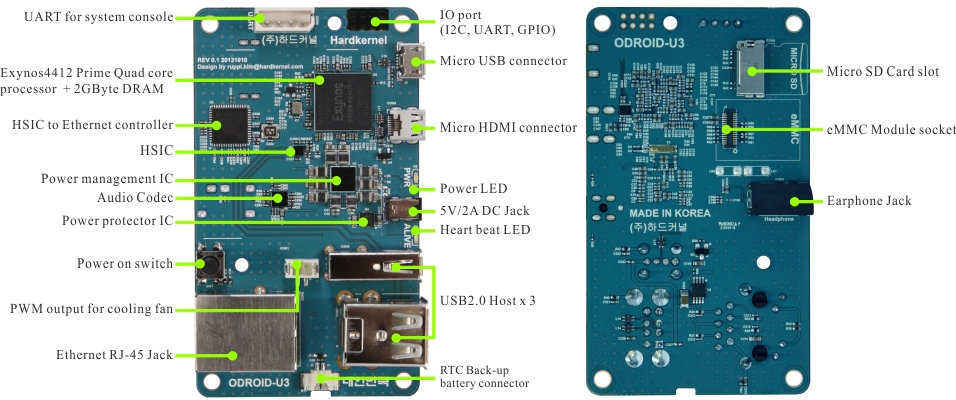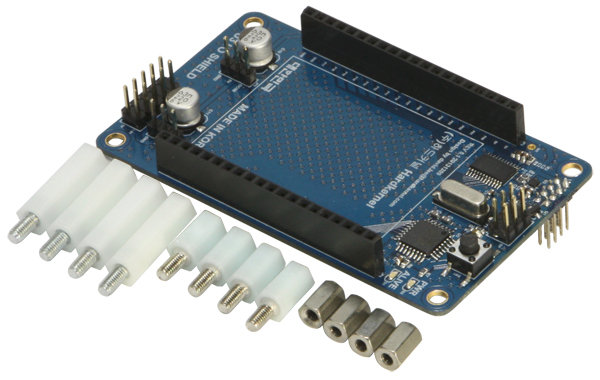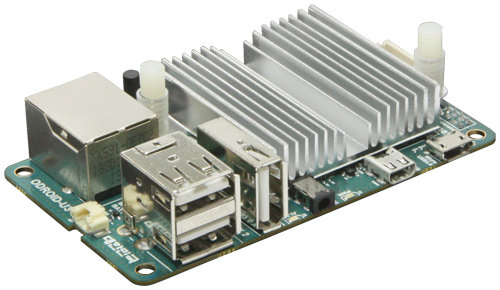Hardkernel ODROID board family already features of the most cost effective development / hobbyist boards in the market. But the company has done it again, with ODROID-U3 a quad core board, software compatible with ODROID-U2, that sells for just $59 + shipping.
ODROID-U3 specifications:
- SoC – Samsung Exynos 4412 Prime @ 1.7 Ghz with ARM Mali-400MP4 GPU @ 440MHz
- System Memory – 2GB @ 880MHz
- Storage – microSD slot, eMMC module socket
- USB – 3x USB 2.0 Host ports, 1x USB 2.0 device for ADB/mass storage
- Ethernet – 10/100Mbps (LAN9730)
- Video Output – micro HDMI
- Audio Output – 3.5mm Jack, micro HDMI
- System Console – UART (1.8Volt)
- DC Power – 5V/2A
- PCB Dimension – 83 x 48mm
- Weight – 48g with heatsink

The company provides images and source code for Xubuntu 13.10, Android 4.x with u-boot 2010.12 and kernel 3.8, as well as the schematics (PDF). Support is available on ODROID-U3 Forums. Compared to the $89 ODROID-U2 board, you’ll get an extra USB port, access to I/Os, a power button, support for external RTC, and better input power protection, but lose the digital microphone. ODROID-U3 is however considerably larger than ODROID-U2 (83 x 48mm vs 48 x 52mm), but it’s still a credit card sized board.

The company is also selling the U3-IO shield ($20) for the board, in order to provide easy access to 36 I/O pins including GPIOs, PWM, and ADC ports. The board has the same size of ODROID-U3, features Atmel ATMega328 and 2 Arduino compatible headers, and schematics (PDF) are available. The board comes with 12 metallic / plastic PCB spacers.
There are actually two version of the board: ODROID-U3 and ODROID-U3 Community Edition. The only difference is the price: $65 for the former, and $59 for the latter, and that you can only order one piece of the community edition version. The company also sell accessories separately for the board including a DC power adapter, a plastic case, a microSD card with Linux or Android, Bluetooth and Wi-Fi modules, a USB-UART board, 8/16 and 64 GB eMMC modules, a micro HDMI cable, a USB IO board, an active cooler, and an RTC backup battery. Shipping is expected for January 14, 2014, and adds $25 to the cost.
You can watch ODROID-U3 presentation video below.

Jean-Luc started CNX Software in 2010 as a part-time endeavor, before quitting his job as a software engineering manager, and starting to write daily news, and reviews full time later in 2011.
Support CNX Software! Donate via cryptocurrencies, become a Patron on Patreon, or purchase goods on Amazon or Aliexpress






The latest ODROID magazine also has several articles about the ODROID-X3
http://magazine.odroid.com/assets/201301/pdf/ODROID-Magazine-201301.pdf
Sigh. Pathetic. WTF are they doing? We all need memory, NOT more cores. Not one person I know with a hobbyist board has said “gee I seem CPU bound, wish I had more cores/threads/procs”. I hear over and over “wish I had more memory” EVERY time I talk to anyone about the board they have.
ODROID-X3 would be nice device for computer vision
But ODROID-X3 use old Mali400 GPU
And Mali400 don’t support OpenCL for example
Hardkernel now even has ODROID magazine? They’re doing a great job supporting the boards!
Looks like a great product for the price, especially if well-supported. They do seem to shoot themselves in the foot with high shipping costs though…
Looks great! I wanna have one for Christamas. Is it u3? Or x3?
Fedex express shipping cost is okay for me. I don’t like 45 days of China post deliver.
@armer
Well, you’ll have to wait, since it will start shipping on January 14, 2014. So no toy for christmas.
@onebir
Even with shipping, the total is $84, and you won’t find many quad core boards for this price.
@armer
It’s ODROID-U3. No ODROID-X3 yet.
try this one on it too FatdogArm Alpha4 – 1 November 2013 http://www.murga-linux.com/puppy/viewtopic.php?t=89998
@mary
Is this a Puppy linux for Odroid? Very interesting…
XBMC
so does this have full hw acceleration on xbuntu
@adem
GPU acceleration should be there, but VPU might not be.
There an XBMC Linux for ODROID-U2 @ http://forum.odroid.com/viewtopic.php?f=9&t=2104.
But some people seem to be getting 14-18 fps @ 1080p so it could be software decode.
is this the same as my galaxy note 2 n7105. well the specs are the same
For me, the problem with the Hardkernel boards is that all of the I/O is over USB – mainly because the SoCs are intended for phones and tablets. Even the Ethernet is done over USB. The only consolation is the fast eMMC, and the newer boards have USB 3.0. Still not as good as having native GigE and a few SATA ports though.
@Ian Tester Wouldn’t be surprised to see a similar cut-price version of the 8 core board with USB 3.0 from them pretty soon given the pace they seem to be able to design boards…
The other downside is the taxes… But this board is less expensive than the previous one iirc.
$65 + $25 add ~20% of the previous sum as VAT in Europe + a fee for the shipping company who paid the custom taxes in advance for you but I agree that might be a minor downside for most people buying this, the hardware is solid.
Hardkernel’s stuff is very cool on paper. But if live in the US and you buy one that they didn’t plug in before shipping, expect to pay at least half the cost of the board (if not the entire cost) to replace it. Their “warranty” doesn’t include shipping. I found out the hard way. And they are inflexible and don’t take responsibility for their laxness when it comes to QA.
Shipping, duty, taxes, clearance and document fees will more than double the cost of this board before I can actually unbox it. It’s so sad. When Governments get in the middle, commerce suffers – actually, everyone suffers!
I agree that they must have a few official distributors or resellers in the US.
@IW
My 2 GB arndale board runs web server, mail server, file server, mldonkey, mysql, mythtv backend and a few vnc servers for various other stuff, and it uses around 1.5 GB RAM for cache.
I can hardly imagine why 2 GB shouldn’t be fine 🙂 – I for one would like more processing power for transcoding, as mythtv doesn’t support openCL for that yet.
Now you know (of) one hoppyist that thinks 2 GB is enough.
2 GB is a big step up from the Raspberry Pi’s 256 MB, of which 16 MB at minimum is reserved for the GPU. Some of us are having to make do with that. I’m running MiniDLNA, webfsd, sshd, cifs, and an ntp client and server on my 256 MB Pi. The newer ones have 512 MB which is such a big improvement for most things. I can’t wait for my 2 GB quad-core CuBox-i to arrive, which after some delays is now supposed to be shipped by January 15.
There is now a US distributor with the full line of ODROIDs and accessories at http://ameridroid.com . Priority shipping to the US is $6 for most orders.